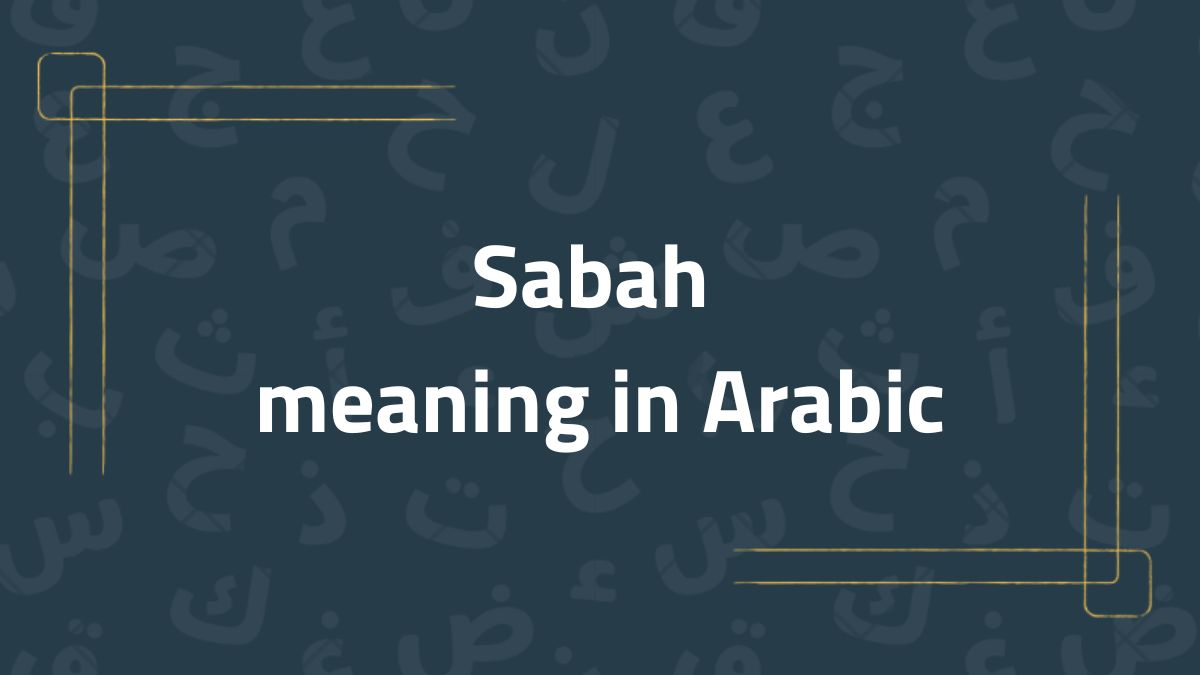The Word Sabah Meaning in Arabic With Examples

The Arabic word “Sabah” (صباح) is commonly used in daily conversation. It carries a simple yet important meaning. This article explains the definition, pronunciation, grammatical usage, and cultural significance of “Sabah.” You will also learn example sentences and common mistakes to avoid.
The Meaning of “Sabah” in Arabic
“Sabah” translates to “morning” in English. It refers to the early part of the day, from dawn until noon. The pronunciation is “sa-baah” with emphasis on the second syllable.
A related greeting is “Sabah al-khayr” (صباح الخير), meaning “Good morning.” This phrase is widely used in Arabic-speaking countries.
Linguistic Root and Grammatical Usage
The root of “Sabah” comes from the Arabic letters ص-ب-ح (ṣ-b-ḥ). This root relates to morning or early day.
Grammatically, “Sabah” is a noun. It does not change form based on gender but can take different endings based on sentence structure. For example:
-
“Sabah al-jameel” (صباح الجميل) – “Beautiful morning”
-
“Fi as-sabah” (في الصباح) – “In the morning”
Examples of “Sabah” in Arabic Sentences
-
صباح الخير! كيف حالك؟
“Sabah al-khayr! Kayfa haluk?”
“Good morning! How are you?” -
أستيقظ باكرًا كل صباح.
“Astaiqizhu bakiran kulla sabah.”
“I wake up early every morning.” -
هذا الصباح كان هادئًا.
“Hatha as-sabah kana hadi’an.”
“This morning was quiet.”
Cultural or Quranic Significance of “Sabah”
The word “Sabah” appears in the Quran in different forms. One example is in Surah Muzzammil (73:6):
“إِنَّ نَاشِئَةَ اللَّيْلِ هِيَ أَشَدُّ وَطْئًا وَأَقْوَمُ قِيلًا”
“Indeed, the hours of the night are more effective for concurrence [of heart and tongue] and more suitable for words [of prayer and Quranic recitation].”
Here, “nashi’ata al-layl” refers to the early night, but the root ص-ب-ح is related to time divisions.
In Arab culture, mornings are important for greetings and starting the day positively.
Common Misunderstandings or Mistakes
Some learners confuse “Sabah” with similar words:
-
“Sabaah” (سباح) means “swimmer.”
-
“SabaaH” (صباح) is the correct spelling for “morning.”
Another mistake is mispronouncing “Sabah al-khayr” as “Sabah al-khair”—the correct pronunciation has a “kh” sound (like the German “ch”).
Why You Should Learn “Sabah”
Learning “Sabah” helps in daily Arabic conversations. It is essential for greetings and time-related discussions. If you study the Quran, understanding time-related words like “Sabah” improves comprehension.
Conclusion
The Arabic word “Sabah” means “morning.” It is used in greetings like “Sabah al-khayr” and appears in the Quran. Knowing this word improves communication and cultural understanding. Practice using it in sentences to master its correct usage.
Discover the Quran and Arabic with Shaykhi Academy
We highly recommend Shaykhi Academy for anyone seeking to learn the Quran and Arabic with excellence. The academy is known for combining expert teaching with a compassionate approach, making it a top choice for students worldwide who want to connect deeply with the words of Allah.
At Shaykhi Academy, you’ll find highly qualified teachers who specialize in guiding learners of all ages and levels. Whether you’re just beginning your journey with Arabic letters or aiming to master Tajweed and Quran recitation, their personalized lessons ensure steady progress at your own pace.
With engaging classes, flexible scheduling, and a focus on both spiritual and linguistic growth, Shaykhi Academy makes learning both enjoyable and impactful.
Watch a sample class below to see Shaykhi Academy in action:
Learn Arabic, Quran, And Tajweed With Free Trial!
Make your home a place of faith, understanding, and connection with the Quran. Whether you're starting from scratch or deepening your knowledge, Shaykhi Academy is here to guide you — step by step. ✅ Tailored for all ages ✅ Clear, structured learning ✅ Flexible online sessions ✅ Book your free trial session now!
Learn More
